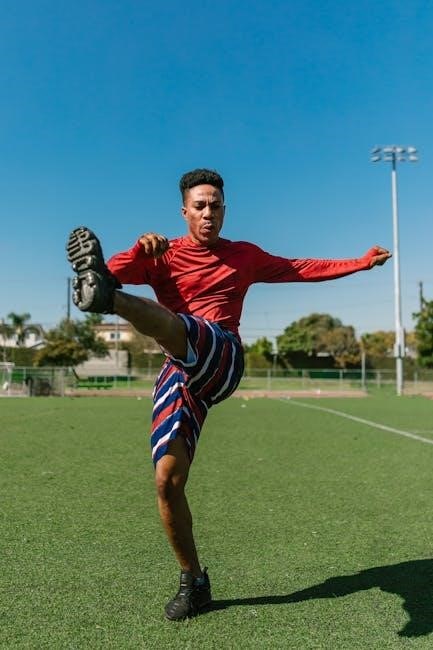U12 soccer practice plans are structured sessions designed to enhance skill development, tactical awareness, and physical fitness in young players․ These plans, often available as downloadable PDF templates, provide coaches with organized drills and activities tailored to the U12 age group․ They focus on essential skills like ball control, passing, shooting, and teamwork, while also emphasizing mental preparation and game sense․ By following these plans, coaches can ensure engaging and effective training sessions that help players excel on the field․
Overview of U12 Soccer Development
The U12 phase is a critical period for refining soccer skills and developing tactical understanding․ Players at this age typically enhance their ball control, passing accuracy, and game awareness․ Coaches focus on building strength, speed, and agility while introducing more complex strategies․ The U12 age group is considered the “Golden Age of Learning,” where young athletes can absorb and apply new skills effectively․ Practices emphasize teamwork, decision-making, and mental preparation, preparing players for competitive matches․ This stage also sees the integration of positional awareness and small-sided games to improve adaptability․ The goal is to create well-rounded, confident players capable of executing both individual and team-based plays effectively․
Importance of Structured Practice Plans
Structured practice plans are essential for fostering consistent improvement and engagement among U12 soccer players․ These plans ensure that each training session is purposeful, with clear objectives and measurable outcomes․ By organizing drills, exercises, and small-sided games, coaches can address key areas like ball control, passing, and teamwork․ Structured plans also help players stay focused and motivated, as they provide a sense of progression and achievement․ Additionally, they allow coaches to adapt activities to meet the needs of individual players, ensuring everyone develops effectively․ A well-organized practice plan promotes discipline, maximizes training time, and supports the overall growth of young athletes in a fun and challenging environment․

Key Components of U12 Soccer Practice Plans
U12 plans focus on ball control, passing, shooting, and goalie integration, with drills designed to improve technical skills, tactical awareness, and teamwork through structured, age-specific activities․
Ball Control and Dribbling Drills
Ball control and dribbling drills are essential for U12 players, focusing on improving close control, precision, and confidence with the ball․ These exercises often involve cone setups where players weave through obstacles, emphasizing quick footwork and balance․ Small-sided games like 2v2 or 3v3 encourage applying these skills in game-like situations․ Drills also include activities where players dribble through grids or around markers, fostering creativity and decision-making․ Coaches can adapt these drills to challenge players of varying skill levels, ensuring everyone improves their ability to maintain possession and outplay opponents effectively․
Passing and Receiving Exercises
Passing and receiving exercises are fundamental to U12 soccer practice plans, focusing on developing accuracy, timing, and teamwork․ These drills often involve short passing sequences, wall passes, and dynamic exercises that simulate game situations․ Players practice using different parts of the foot to control and distribute the ball effectively․ Receiving drills emphasize proper foot placement, body positioning, and movement to create space․ Coaches incorporate small-sided games like 3v3 or 4v4 to apply these skills in real-time scenarios, fostering better communication and decision-making․ These exercises build confidence and ensure players can maintain possession while transitioning into attacking plays seamlessly․
Shooting and Goalie Integration
Shooting and goalie integration drills are essential in U12 soccer practice plans, focusing on improving accuracy, power, and decision-making in front of the goal․ Players practice various shooting techniques, such as instep drives, volleys, and chip shots, while goalkeepers work on reflexes, positioning, and saving diverse shots․ These exercises often involve dynamic setups, like breakaways or angled shots, to simulate game scenarios․ Coaches encourage shooters to aim for specific areas of the net and goalies to communicate effectively․ Integrating both skills into drills ensures a balanced development of offensive and defensive capabilities, preparing players for competitive match situations while fostering teamwork between outfield players and goalkeepers․

Tactical and Mental Development
Tactical and mental development focuses on improving decision-making, spatial awareness, and game sense․ Players learn to read the game, anticipate moves, and execute strategies effectively under pressure․
Small-Sided Games for Tactical Awareness
Small-sided games, such as 3v3 or 4v4, are essential for developing tactical awareness in U12 players․ These games simplify the soccer environment, allowing players to focus on decision-making, spatial awareness, and teamwork․ By reducing the number of players, each participant is more involved, fostering problem-solving and adaptability․ Coaches can introduce specific rules or objectives to target skills like maintaining possession, creating scoring opportunities, or defending effectively․ Rotating players through different positions also enhances their understanding of the game․ These structured yet dynamic activities prepare young athletes for larger teamplay while keeping the practice engaging and competitive․
Mental Preparation and Game Sense
Mental preparation and game sense are crucial for U12 players to excel on the field․ Coaches can integrate activities that promote focus, confidence, and strategic thinking․ Techniques such as visualization, positive reinforcement, and mindfulness help players stay composed under pressure․ Game sense is developed through small-sided games and scenario-based drills, encouraging players to make quick decisions and read the game effectively․ These exercises build resilience and tactical awareness, enabling players to adapt to different situations during matches․ By fostering a mindset of continuous learning and adaptability, coaches can help young athletes develop the mental toughness needed for success in soccer․
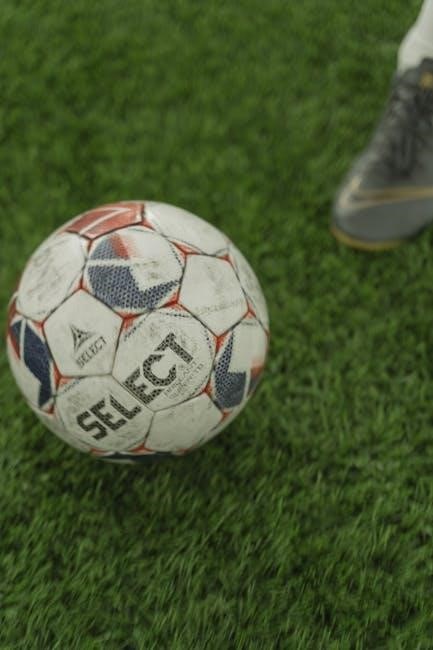
Practice Plan Resources
Discover comprehensive U12 soccer practice plans in PDF format, offering adaptable sessions with age-specific drills․ Downloadable templates and sample plans ensure effective training and player development․
Downloadable PDF Templates
Downloadable PDF templates for U12 soccer practice plans provide coaches with structured and adaptable session outlines․ These templates include animations, diagrams, and detailed drills, making it easy to organize effective training sessions․ Coaches can access comprehensive resources that focus on ball control, passing, shooting, and goalie integration․ The PDFs offer age-specific activities designed to enhance physical fitness and technical skills․ Players can track their progress, stay motivated, and develop a well-rounded understanding of the game․ These templates are a valuable tool for creating engaging and productive practices, ensuring young athletes gain the skills and confidence needed to excel in soccer․
Sample Practice Sessions
Sample practice sessions for U12 soccer provide coaches with pre-designed, age-specific drills and activities․ These sessions often include warm-ups, skill-focused exercises, and small-sided games․ For example, a session might start with a dynamic warm-up, followed by ball control drills, and conclude with a 4v2 game to practice possession and decision-making; Coaches can adapt these sessions to suit their team’s needs, ensuring players stay engaged and challenged․ Tips for handling common challenges, like an odd number of players or missing equipment, are also included․ These sample sessions offer a flexible framework for effective and enjoyable practices, helping players develop both skills and confidence․
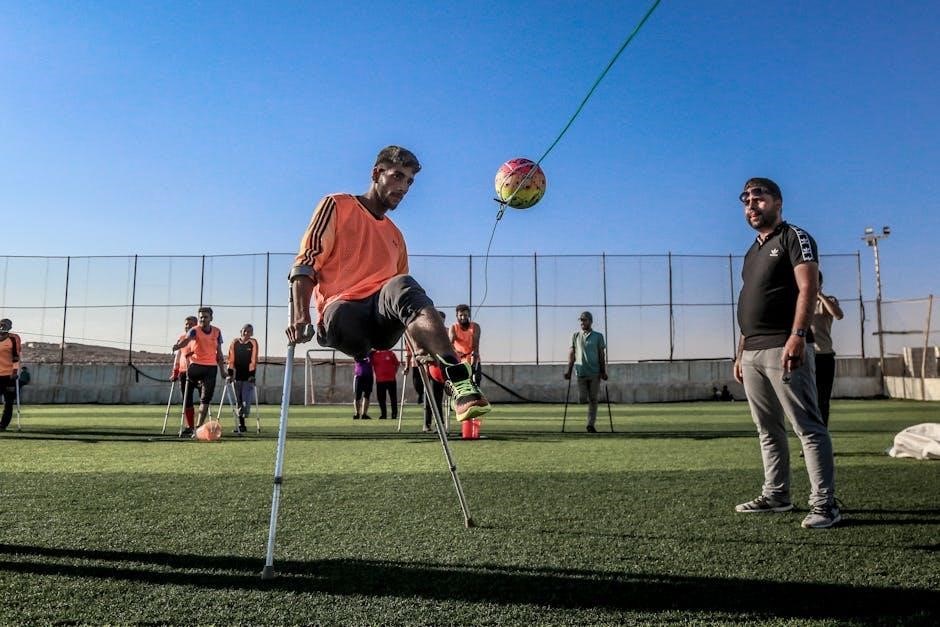
Hydration, Nutrition, and Safety
Proper hydration and nutrition are vital for young athletes to perform optimally․ Encourage water intake before, during, and after practices․ A balanced diet rich in carbs, proteins, and fruits supports energy levels and recovery․ Safety is paramount, with a focus on preventing injuries through warm-ups and proper gear; Coaches should also be prepared for emergencies with first aid kits and knowledge of injury management․ Creating a safe and healthy environment ensures players can focus on skill development and teamwork․
Hydration Tips for Young Athletes
- Encourage players to drink water an hour before practice to ensure proper hydration․
- Bring refillable water bottles to practices and games for easy access․
- Take regular water breaks every 15-20 minutes during sessions․
- Avoid sugary drinks that can dehydrate players further․
- Monitor hydration levels by checking urine color; pale yellow indicates proper hydration․
- Teach parents and players to recognize signs of dehydration, such as dizziness or fatigue․
Staying hydrated is essential for performance, focus, and overall health, especially during intense physical activity like soccer․
Nutrition Advice for Soccer Players
- Encourage a balanced diet rich in complex carbs, lean proteins, and healthy fats to fuel energy and recovery․
- Include whole foods like fruits, vegetables, whole grains, and lean meats in meals․
- Avoid sugary and processed foods that can lead to energy crashes․
- Ensure players eat a nutritious meal 2-3 hours before practice or games․
- Provide snacks like bananas, nuts, or energy bars 30-60 minutes before training․
- Hydrate with water throughout the day, and avoid carbonated drinks․
- Teach players to refuel with a mix of carbs and protein within 30 minutes post-practice․
Proper nutrition supports performance, recovery, and growth, helping young athletes play their best and stay healthy․
Safety and Injury Prevention
- Ensure players warm up properly before practices and games to reduce injury risk․
- Provide proper footwear, shin guards, and goalkeeping gear for safety․
- Teach correct tackling and falling techniques to prevent injuries․
- Encourage regular hydration to avoid dehydration-related issues․
- Monitor players for signs of fatigue or pain and rest them when needed․
- Have a first-aid kit available and ensure coaches are trained in basic first aid․
- Create a safe playing environment free from hazards․
Prioritizing safety and injury prevention helps protect young players and ensures they can enjoy the game while staying healthy․
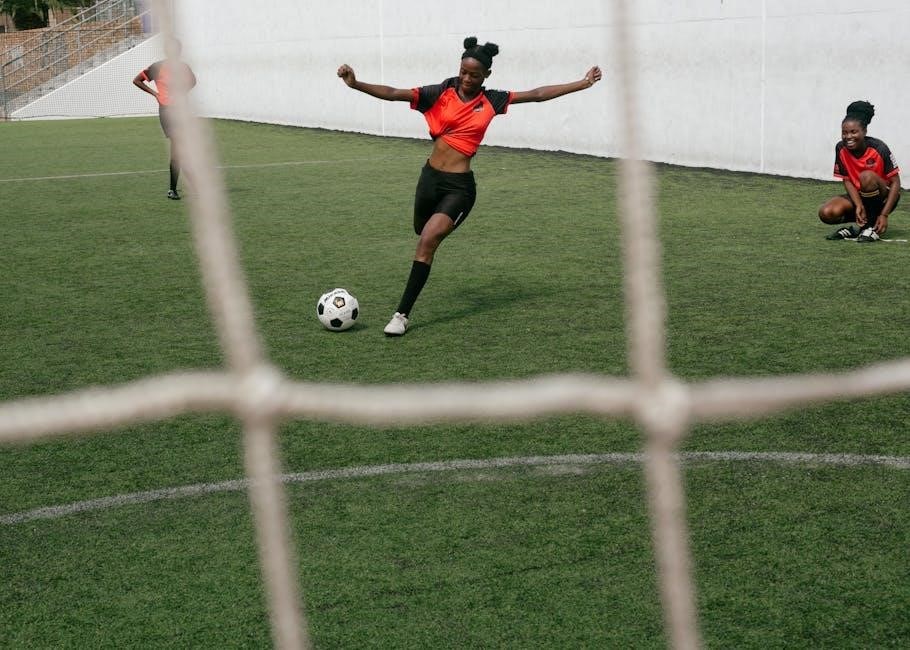
Coaching Tips and Best Practices
Preparation is key—understand your session plan and adapt drills to meet player needs․ Foster a positive environment, encouraging creativity and teamwork․ Provide constructive feedback and ensure equal attention to all players, helping them grow both technically and mentally․
Adapting Drills to Player Needs
Adapting drills to player needs ensures effective skill development and engagement․ Coaches should assess individual and team abilities to modify exercises accordingly․ For example, simplify drills for less experienced players or add complexity for advanced ones․ Small group activities, such as 3v3 or 4v2 games, allow for tailored focus on specific skills like ball control or passing․ Incorporate variations in drill setups, such as cone layouts or time constraints, to keep practices dynamic․ Encourage creativity by letting players suggest modifications․ Additionally, use visual aids like diagrams or animations to clarify expectations․ This approach fosters a supportive environment where every player feels challenged and valued․
Encouraging Team Dynamics
Building strong team dynamics is essential for fostering collaboration and unity among U12 players․ Coaches can promote teamwork through activities like small-sided games, partner drills, and group challenges․ Encourage open communication by incorporating exercises that require verbal and non-verbal coordination․ Rotate leadership roles during drills to help players develop decision-making skills and trust in one another․ Celebrate collective achievements to reinforce the value of teamwork․ Additionally, pair players with varying skill levels to promote mutual support and learning․ By creating a positive, inclusive environment, coaches can help players build lasting bonds and a shared commitment to improving together both on and off the field․
Effective U12 soccer practice plans foster skill development, teamwork, and a love for the game, preparing young players for long-term success both on and off the field․
Final Thoughts on Effective Practice Planning
Effective U12 soccer practice planning requires a balance of structure and adaptability, ensuring each session engages players while addressing their developmental needs․ Coaches should prioritize drills that enhance technical skills like ball control and passing, while also fostering tactical awareness through small-sided games․ Incorporating mental preparation and hydration tips can further optimize training․ Utilizing downloadable PDF templates and sample practice plans provides coaches with valuable resources to create well-rounded sessions․ By focusing on player progression and team dynamics, coaches can help young athletes build a strong foundation for future success in soccer, making each practice both productive and enjoyable for all involved․
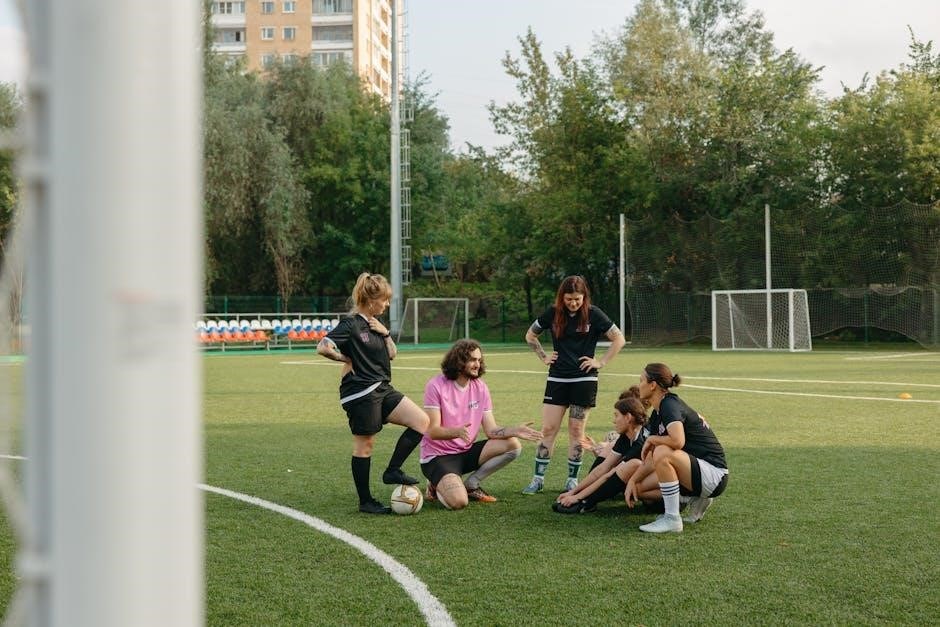
Sources and Further Reading
Coaches can find comprehensive U12 soccer practice plans in PDF format through resources like the Ontario Soccer Association and Sunnyvale Alliance Soccer Club․ These documents provide detailed drills, session templates, and tactical guidance, ensuring coaches have access to well-structured training materials for young athletes․
Recommended Resources for Coaches
Coaches seeking high-quality U12 soccer practice plans can explore resources from reputable organizations like the Ontario Soccer Association and the Sunnyvale Alliance Soccer Club․ These entities offer detailed PDF guides and coaching manuals that include age-specific drills, tactical exercises, and sample practice sessions․ Additionally, the WASA Coaching Manual provides comprehensive insights into structuring effective training programs for U12 players․ These resources are designed to help coaches create engaging, skill-focused sessions while ensuring player development and teamwork․ They are widely regarded as essential tools for coaches aiming to deliver structured and impactful training․
